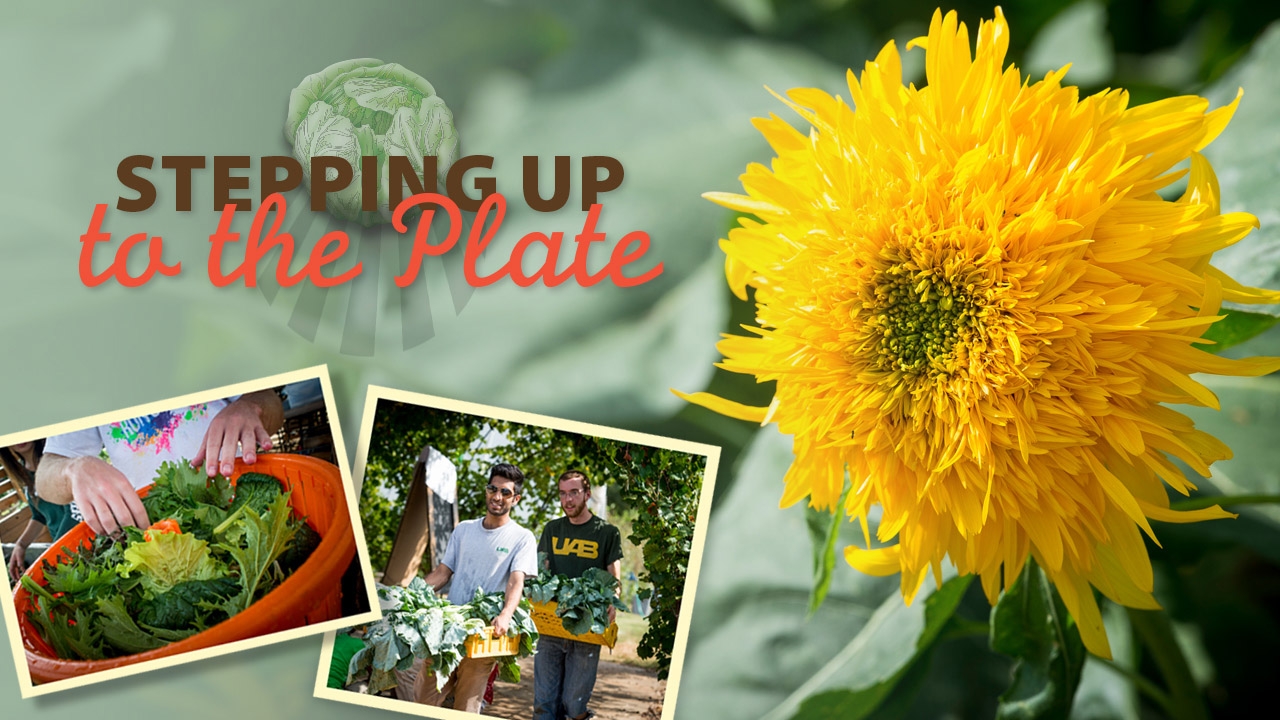 Subria Spencer (top) and Sean McMahon (bottom) join the harvest at Jones Valley Teaching Farm in downtown Birmingham.
Subria Spencer (top) and Sean McMahon (bottom) join the harvest at Jones Valley Teaching Farm in downtown Birmingham.Hunger doesn’t look the way it used to. “With the 2008 economic decline, people whom you would never imagine to be food insecure are one paycheck away from not having enough money for groceries,” says Amy Badham, an instructor in UAB’s School of Public Health and affiliate of the UAB Sparkman Center for Global Health.
Her Food Security and Nutrition course, part of UAB’s undergraduate major in public health, offers students a close look at the subject’s many facets. “It’s not always hunger either,” Badham says. “A lot of what we look at is the number of people who don’t have access to healthy food. Food insecurity is almost always associated with poverty, so where you find one, you find both.” In Birmingham, as many as 88,000 people live in areas where they have very little access to healthy and/or affordable foods, she notes.
Farm to Table
Lectures, article discussions, peer presentations, and guest speakers helped students explore the theoretical concepts of food security and hunger. After learning how they apply to Birmingham, the class looked at how the same issues are addressed nationally and globally. “We talked a lot about S.N.A.P. [Supplemental Nutrition Assistance Program] benefits,” says Sean McMahon, a junior public health major from Millbrook, Alabama. “There’s also a lot of discussion about the accessibility and availability of food, and more specifically, healthy food.”
Then, each week, the students dug a little deeper into their subject—sometimes literally—to get a hands-on look at how local organizations fight hunger and food insecurity. For nine weeks, students volunteered with Jones Valley Teaching Farm (JVTF) in downtown Birmingham, harvesting crops, picking up trash, doing maintenance work, and interacting with the farm’s educational programs. “The goal for the service-learning component was to be mutually beneficial,” says Badham. “We’re here to learn, but we’re also here to offer 15 people’s manpower for an hour.”
 Amy Badham (top right) involves students in local initiatives against hunger and food insecurity through service learning at Jones Valley Teaching Farm and Magic City Harvest.
Amy Badham (top right) involves students in local initiatives against hunger and food insecurity through service learning at Jones Valley Teaching Farm and Magic City Harvest.
While working at the farm, Subria Spencer, a junior in the course, was struck by the potential of JVTF’s educational outreach. The farm “brings in students from different elementary schools, has them see how things are grown, and then they’re able to try the foods they pick,” says the Auburn native. She believes that educational initiatives could have “the greatest impact” on improving access to healthy food in the community.
After the fall harvest, students experienced a different type of solution by working with Magic City Harvest. This organization recovers unused prepared and perishable food from local restaurants. Once it’s picked up, it’s redistributed to a place or organization that provides meals for hungry individuals. “The students see what can be done with no additional resources,” says Badham.

Seeds of Commitment
For McMahon and Spencer, the class has also strengthened their commitment to work with nutrition and food insecurity after graduation. “I want to do urban agriculture,” says McMahon. “I’m more aware of these issues now, and it was interesting to see some of the solutions rather than just talking about the problem.”
Spencer had much the same reaction. “I’m hoping to get into community development in lower-income areas, specifically targeting food and nutrition security,” she says. “That could be locally or internationally. I want to travel and somehow incorporate those skills into my career.” Already, she has interned with East Lake United Methodist Church’s P.E.E.R. nonprofit organization, which promotes community health, education, and development through a farmers market and other initiatives in Birmingham’s East Lake neighborhood.
Badham reports that many students credit the class for helping them identify a topic to work with in the long term. “There are so many ways to approach the issues of food and hunger and nutrition,” she says. The course is about “raising awareness, but also helping them to find their passion.”

• Learn more about UAB's undergraduate programs in public health.
• Give something and change everything for students pursuing public-health careers.


